wheel Citroen BERLINGO MULTISPACE 2016 2.G Owner's Guide
[x] Cancel search | Manufacturer: CITROEN, Model Year: 2016, Model line: BERLINGO MULTISPACE, Model: Citroen BERLINGO MULTISPACE 2016 2.GPages: 296, PDF Size: 10.36 MB
Page 132 of 296
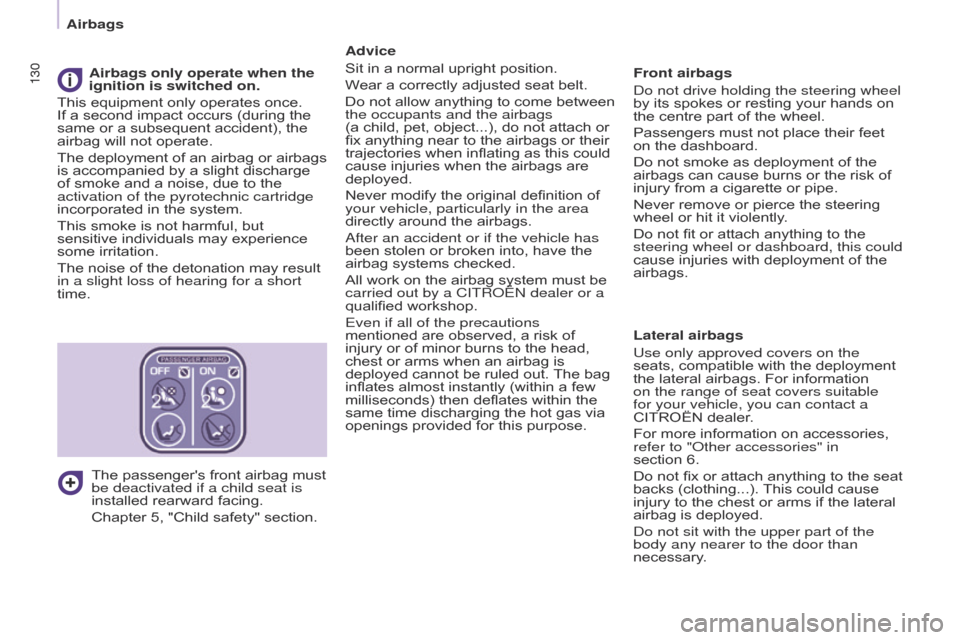
130
Berlingo-2-VP_en_Chap05_Securite_ed01-2016
130
Advice
Sit in a normal upright position.
Wear
a correctly adjusted seat belt.
Do
not
allow
anything
to
come
between
the occupants and the airbags
(a
child, pet, object...), do not attach or
fix
anything near to the airbags or their
trajectories
when inflating as this could
cause
injuries when the airbags are
deployed.
Never
modify the original definition of
your vehicle, particularly in the area
directly
around the airbags.
a
fter an accident or if the vehicle has
been
stolen or broken into, have the
airbag
systems checked.
All
work on the airbag system must be
carried out by a CITR
o Ë n dealer or a
qualified
workshop.
Even if all of the precautions
mentioned
are observed, a risk of
injury
or of minor burns to the head,
chest
or arms when an airbag is
deployed
cannot be ruled out.
The
bag
inflates
almost instantly (within a few
millis
econds) then deflates within the
same
time discharging the hot gas via
openings
provided for this purpose.Front airbags
d
o not drive holding the steering wheel
by
its spokes or resting your hands on
the
centre part of the wheel.
Passengers
must not place their feet
on
the dashboard.
Do
not smoke as deployment of the
airbags
can cause burns or the risk of
injury
from a cigarette or pipe.
Never
remove or pierce the steering
wheel
or hit it violently.
Do
not fit or attach anything to the
steering wheel or dashboard, this could
cause
injuries with deployment of the
airbags.
Lateral airbags
Use only approved covers on the
seats,
compatible with the deployment
the
lateral airbags. For information
on the range of seat covers suitable
for your vehicle, you can contact a
CITROËN dealer
.
For
more information on accessories,
refer to "
o ther accessories" in
section 6.
Do
not fix or attach anything to the seat
backs
(clothing...).
This
could cause
injury
to the chest or arms if the lateral
airbag
is deployed.
d
o not sit with the upper part of the
body any nearer to the door than
necessary.
Airbags only operate when the
ignition is switched on.
This
equipment
only
operates
once.
If
a
second
impact
occurs
(during
the
same
or
a
subsequent
accident),
the
airbag
will
not
operate.
The
deployment
of
an
airbag
or
airbags
is
accompanied
by
a
slight
discharge
of
smoke
and
a
noise,
due
to
the
activation of the pyrotechnic cartridge
incorporated
in
the
system.
This
smoke
is
not
harmful,
but
sensitive
individuals
may
experience
some
irritation.
The
noise
of
the
detonation
may
result
in a slight loss of hearing for a short
time. The
passenger's
front
airbag
must
be deactivated if a child seat is
installed
rearward
facing.
Chapter
5,
"Child
safety"
section.
airbags
Page 134 of 296
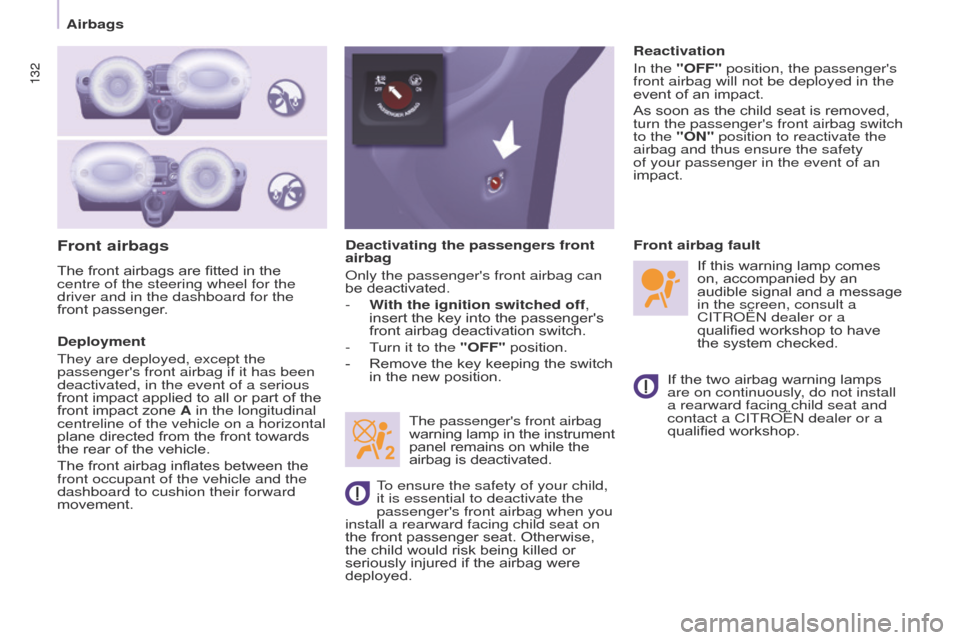
132
Berlingo-2-VP_en_Chap05_Securite_ed01-2016
132
Front airbags
Deployment
They are deployed, except the
passenger's front airbag if it has been
deactivated, in the event of a serious
front impact applied to all or part of the
front
impact zone A in the longitudinal
centreline of the vehicle on a horizontal
plane
directed from the front towards
the
rear of the vehicle.
The
front airbag inflates between the
front occupant of the vehicle and the
dashboard to cushion their forward
movement. Deactivating the passengers front
airbag
o
nly the passenger's front airbag can
be deactivated.
-
W
ith the ignition switched off,
insert the key into the passenger's front
airbag deactivation switch.
- T urn it to the "OFF" position.
-
Remove
the key keeping the switch
in
the new position.
The passenger's front airbag
warning
lamp
in
the
instrument panel
remains on while the
airbag
is deactivated.If
the two airbag warning lamps
are on continuously
, do not install
a rearward facing child seat and
contact a CITR
o Ë n dealer or a
qualified
workshop.
Front airbag fault
To ensure the safety of your child,
it is essential to deactivate the
passenger's front airbag when you
install a rearward facing child seat on
the
front passenger seat. Otherwise,
the
child would risk being killed or
seriously
injured if the airbag were
deployed.Reactivation
In the
"OFF" position, the passenger's
front airbag will not be deployed in the
event of an impact.
As soon as the child seat is removed,
turn the passenger's front airbag switch
to the
"ON" position to reactivate the
airbag and thus ensure the safety
of your passenger in the event of an
impact.
If this warning lamp comes
on,
accompanied by an
audible
signal and a message
in the screen, consult a
CITR
o Ë n dealer or a
qualified workshop to have the
system checked.
The
front airbags are fitted in the
centre of the steering wheel for the
driver and in the dashboard for the
front
passenger.
airbags
Page 150 of 296
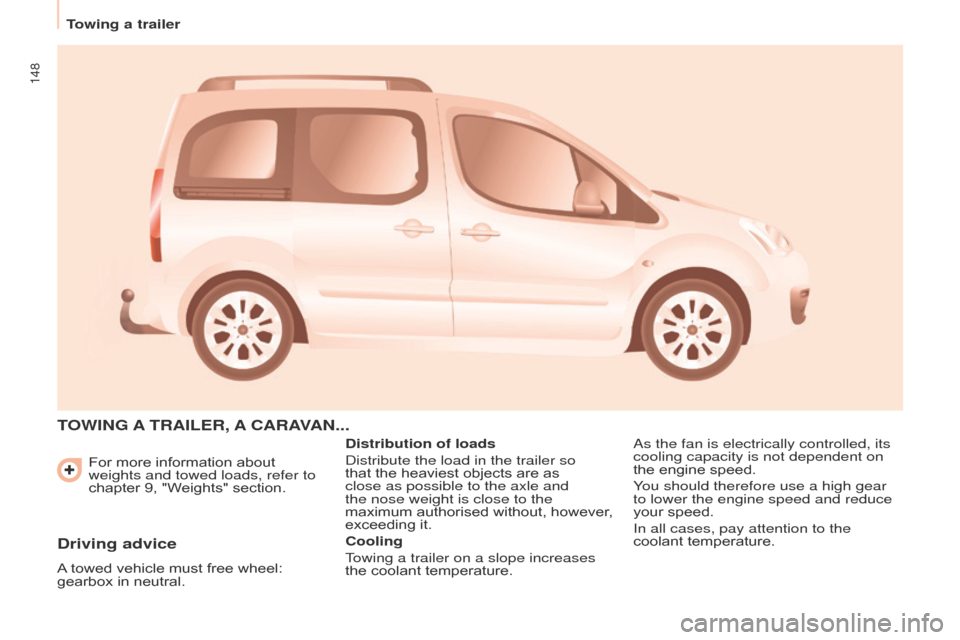
148
Towing a trailer
Berlingo-2-VP_en_Chap06_accessoire_ed01-2016
For more information about weights and towed loads, refer to
chapter 9, "Weights" section.
TOWING A TRAILER , A CARA VAN ...
Distribution of loads
d
istribute the load in the trailer so
that
the heaviest objects are as
close as possible to the axle and
the nose weight is close to the
maximum
authorised without, however,
exceeding
it.
Cooling
Towing a trailer on a slope increases
the
coolant temperature.a s the fan is electrically controlled, its
cooling capacity is not dependent on
the
engine speed.
You should therefore use a high gear
to lower the engine speed and reduce
your
speed.
In all cases, pay attention to the
coolant
temperature.
Driving advice
A towed vehicle must free wheel: gearbox
in neutral.
Page 152 of 296
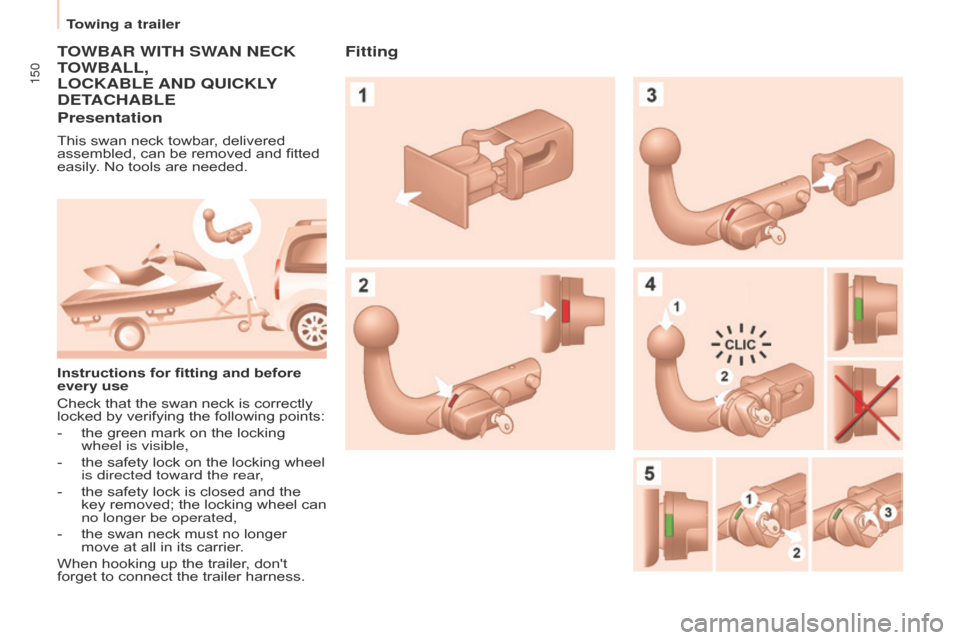
150
Towing a trailer
Berlingo-2-VP_en_Chap06_accessoire_ed01-2016
TOWBAR WITH SWAN NECK T
OWBALL ,
LOCKABLE
AND
QUICKL
Y
DET
ACHABLE
Presentation
This swan neck towbar, delivered assembled, can be removed and fitted
easily
. No tools are needed.
Instructions for fitting and before
every use
Check
that the swan neck is correctly
locked
by verifying the following points:
-
the
green mark on the locking
wheel is visible,
-
the
safety lock on the locking wheel
is directed toward the rear
,
-
the
safety lock is closed and the
key
removed; the locking wheel can
no longer be operated,
-
the
swan neck must no longer
move
at all in its carrier.
When
hooking up the trailer, don't
forget
to connect the trailer harness.
Fitting
Page 154 of 296
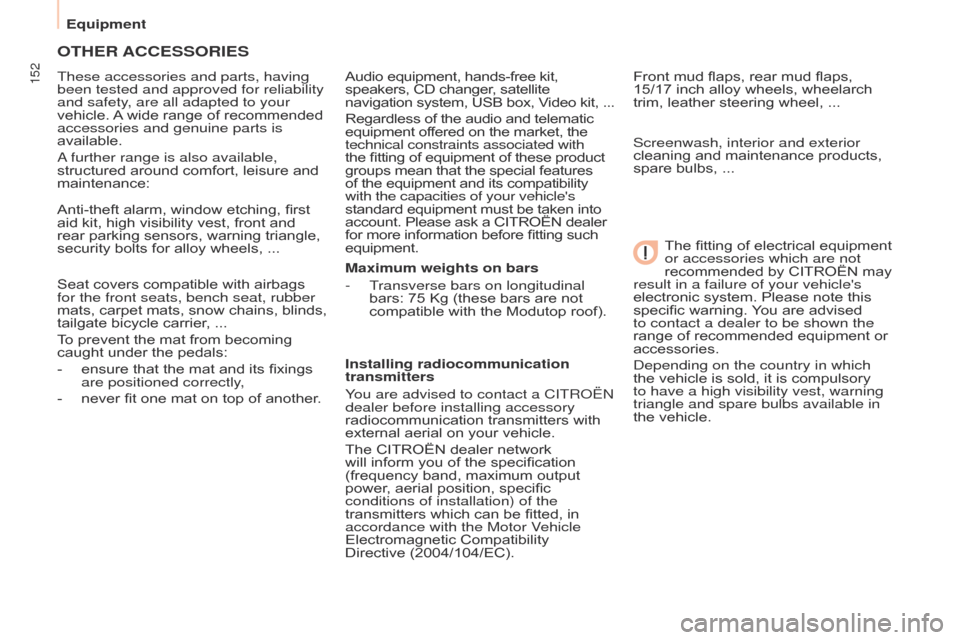
152
Berlingo-2-VP_en_Chap06_accessoire_ed01-2016
Equipment
OTHER ACCESSORIES
These accessories and parts, having
been tested and approved for reliability
and safety, are all adapted to your
vehicle.
A
wide range of recommended
accessories and genuine parts is
available.
a further range is also available,
structured
around comfort, leisure and
maintenance:
Anti-theft
alarm, window etching, first
aid
kit, high visibility vest, front and
rear
parking sensors, warning triangle,
security
bolts for alloy wheels, ...
Seat
covers compatible with airbags
for the front seats, bench seat, rubber
mats,
carpet
mats,
snow
chains,
blinds,
tailgate
bicycle carrier, ...
To
prevent the mat from becoming
caught
under the pedals:
-
ensure
that the mat and its fixings
are positioned correctly
,
-
never
fit one mat on top of another.Audio
equipment, hands-free kit, speakers,
CD changer, satellite navigation
system,
USB
box,
V
ideo
kit,
...
Regardless
of the audio and telematic
equipment
offered on the market, the
technical constraints associated with
the
fitting of equipment of these product
groups
mean that the special features
of
the equipment and its compatibility
with the capacities of your vehicle's
standard
equipment must be taken into
account.
Please ask a CITROËN dealer
for
more information before fitting such
equipment.
Maximum weights on bars
-
T
ransverse bars on longitudinal
bars:
75 Kg (these bars are not
compatible
with the Modutop roof).
Installing radiocommunication
transmitters
You are advised to contact a CITR
o Ë n
dealer before installing accessory
radiocommunication
transmitters with
external
aerial on your vehicle.
The
CITROËN dealer network
will
inform you of the specification
(frequency
band, maximum output
power
, aerial position, specific
conditions of installation) of the
transmitters
which can be fitted, in
accordance with the Motor V
ehicle
Electromagnetic
Compatibility
Directive (2004/104/EC).Front
mud flaps, rear mud flaps, 15/17 inch
alloy wheels, wheelarch
trim,
leather steering wheel, ...
Screenwash, interior and exterior
cleaning
and maintenance products,
spare
bulbs, ...
The
fitting of electrical equipment
or accessories which are not
recommended
by CITROËN may
result in a failure of your vehicle's
electronic
system. Please note this
specific
warning.
Y
ou are advised
to contact a dealer to be shown the
range
of recommended equipment or
accessories.
d
epending on the country in which
the
vehicle is sold, it is compulsory
to have a high visibility vest, warning
triangle and spare bulbs available in
the
vehicle.
Page 173 of 296
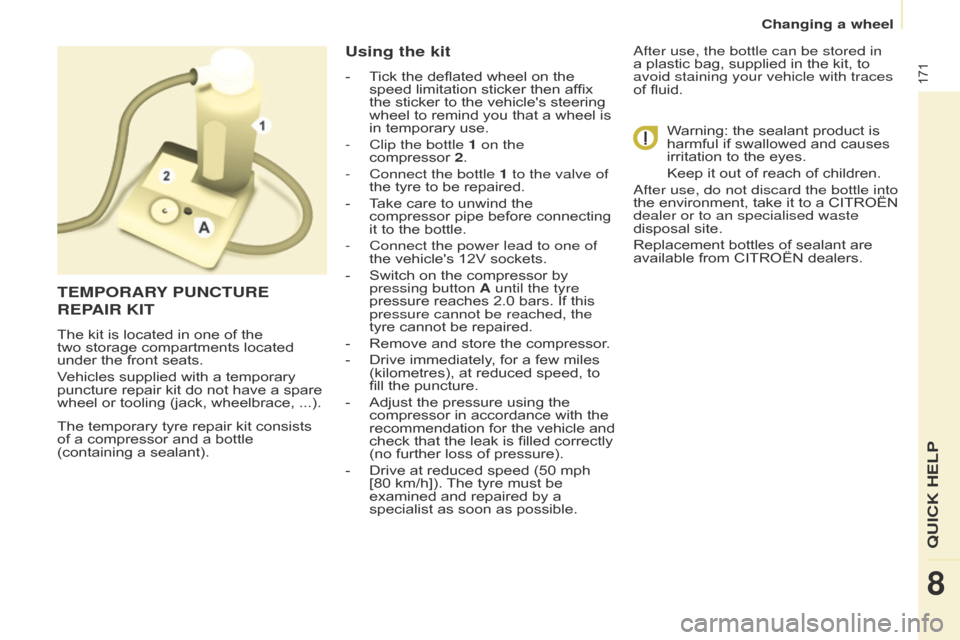
171
Berlingo-2-VP_en_Chap08_aide-rapide_ed01-2016
The temporary tyre repair kit consists of a compressor and a bottle
(containing
a sealant).
Using the kit
- Tick the deflated wheel on the speed
limitation sticker then affix
the
sticker to the vehicle's steering
wheel
to remind you that a wheel is
in
temporary use.
-
Clip the bottle
1 on the
compressor 2.
-
Connect the bottle
1 to the valve of
the
tyre to be repaired.
-
T
ake care to unwind the
compressor
pipe before connecting
it
to the bottle.
-
Connect the power lead to one of
the
vehicle's 12V sockets.
-
Switch
on the compressor by
pressing button
A until the tyre
pressure
reaches 2.0 bars. If this
pressure cannot be reached, the
tyre
cannot be repaired.
-
Remove
and store the compressor.
-
Drive
immediately, for a few miles
(kilometres),
at reduced speed, to
fill
the puncture.
-
Adjust
the pressure using the
compressor
in accordance with the
recommendation
for
the
vehicle
and
check
that the leak is filled correctly
(no
further loss of pressure).
-
Drive
at reduced speed (50 mph
[80
km/h]).
The
tyre must be
examined
and repaired by a
specialist
as soon as possible.
a
fter use, the bottle can be stored in
a plastic bag, supplied in the kit, to avoid staining your vehicle with traces
of
fluid.
Warning:
the sealant product is
harmful
if swallowed and causes
irritation
to the eyes.
Keep
it out of reach of children.
a
fter use, do not discard the bottle into
the
environment, take it to a CITROËN
dealer or to an specialised waste
disposal
site.
Replacement
bottles of sealant are
available
from CITROËN dealers.
TEMPORARY PUNCTURE
REP
AIR KIT
The kit is located in one of the two storage compartments located
under
the front seats.
Vehicles
supplied with a temporary
puncture
repair kit do not have a spare
wheel
or tooling (jack, wheelbrace, ...).
QUICk HELP
8
Changing a wheel
Page 174 of 296
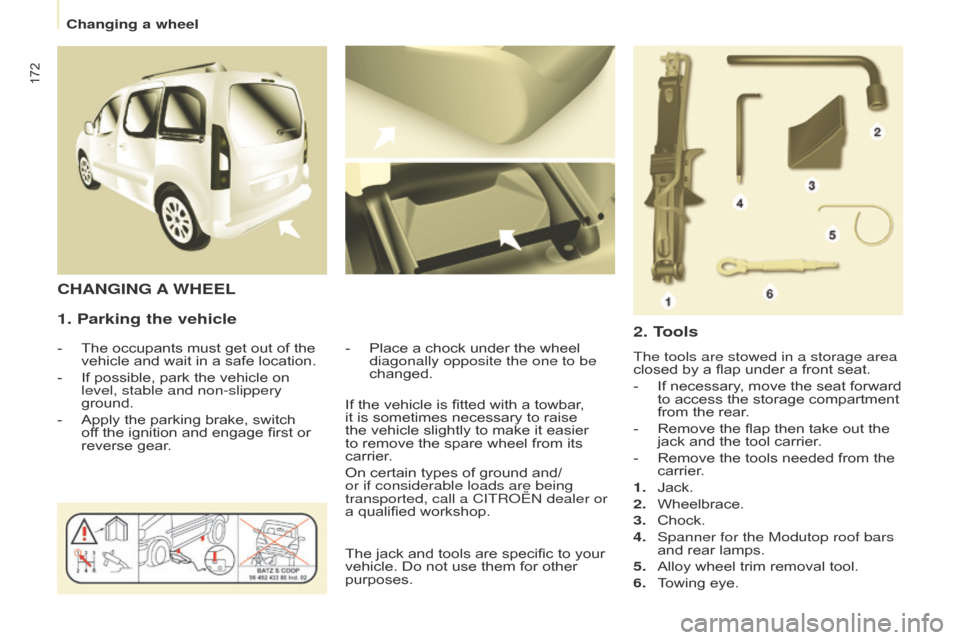
172
Berlingo-2-VP_en_Chap08_aide-rapide_ed01-2016
1. Parking the vehicle
- The occupants must get out of the vehicle
and wait in a safe location.
-
If
possible, park the vehicle on
level, stable and non-slippery
ground.
-
Apply
the parking brake, switch
of
f the ignition and engage first or
reverse
gear. -
Place a chock under the wheel diagonally opposite the one to be
changed.
CHANGING A WHEEL
2. T
ools
The tools are stowed in a storage area
closed by a flap under a front seat.
-
If
necessary, move the seat forward
to
access the storage compartment
from
the rear.
-
Remove
the flap then take out the
jack
and the tool carrier.
-
Remove
the tools needed from the
carrier
.
1.
Jack.
2.
Wheelbrace.
3.
Chock.
4.
Spanner for the Modutop roof bars
and
rear lamps.
5.
Alloy
wheel trim removal tool.
6.
T
owing eye.
If
the
vehicle
is
fitted
with
a
towbar,
it
is
sometimes
necessary
to
raise
the
vehicle
slightly
to
make
it
easier
to
remove
the
spare
wheel
from
its
carrier
.
On
certain
types
of
ground
and/
or if considerable loads are being
transported, call a CITR
o
Ë
n
dealer or
a
qualified
workshop.
The
jack
and
tools
are
specific
to
your
vehicle.
Do
not
use
them
for
other
purposes.
Changing a wheel
Page 175 of 296
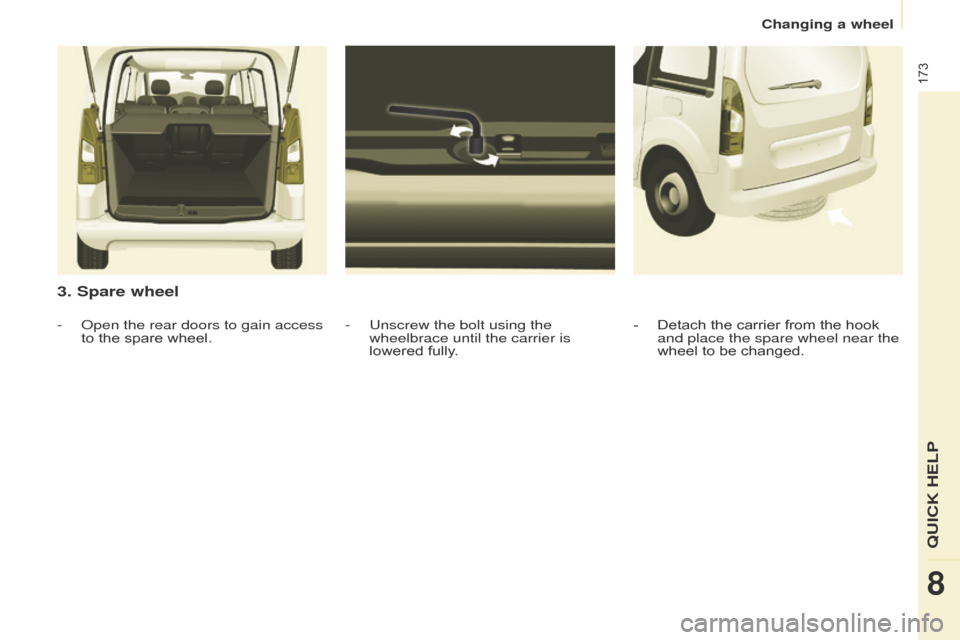
173
Berlingo-2-VP_en_Chap08_aide-rapide_ed01-2016
3. Spare wheel
- Unscrew the bolt using the
wheelbrace until the carrier is
lowered fully.
-
o
pen the rear doors to gain access
to
the
spare
wheel. -
Detach the carrier from the hook and place the spare wheel near the
wheel
to be changed.
QUICk HELP
8
Changing a wheel
Page 176 of 296
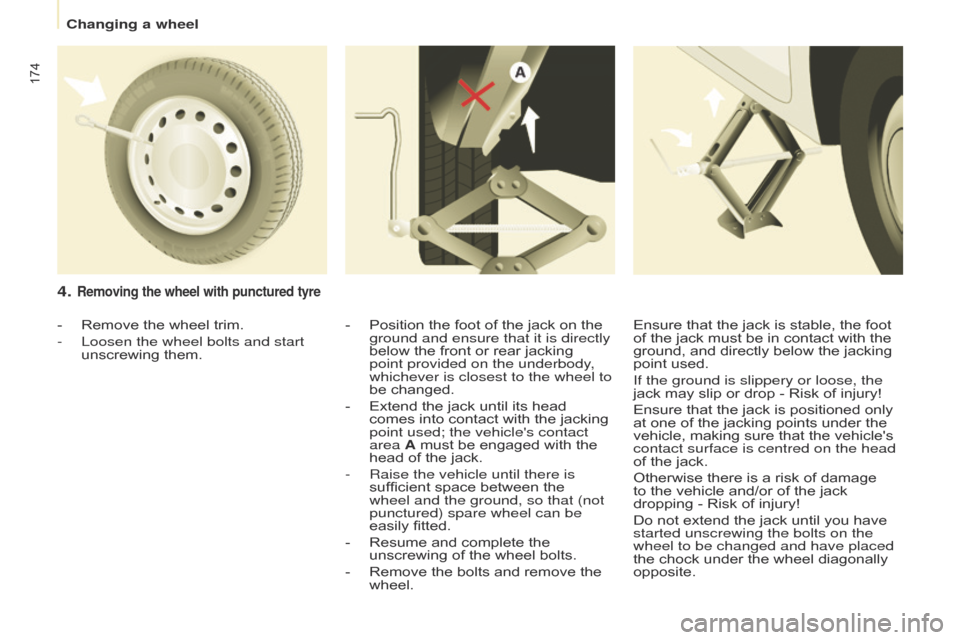
174
Berlingo-2-VP_en_Chap08_aide-rapide_ed01-2016
4. Removing the wheel with punctured tyre
- Position the foot of the jack on the ground and ensure that it is directly
below
the front or rear jacking
point provided on the underbody
,
whichever is closest to the wheel to
be
changed.
-
Extend
the jack until its head
comes
into contact with the jacking
point used; the vehicle's contact
area
A must be engaged with the
head
of the jack.
-
Raise the vehicle until there is
sufficient
space between the
wheel and the ground, so that (not
punctured) spare wheel can be
easily
fitted.
-
Resume
and complete the
unscrewing
of the wheel bolts.
-
Remove
the bolts and remove the
wheel.
-
Remove
the
wheel
trim.
-
Loosen the wheel bolts and start
unscrewing
them. Ensure
that the jack is stable, the foot of
the jack must be in contact with the
ground,
and directly below the jacking
point
used.
If the ground is slippery or loose, the
jack
may slip or drop - Risk of injury!
Ensure
that the jack is positioned only
at
one of the jacking points under the
vehicle,
making sure that the vehicle's
contact surface is centred on the head
of
the jack.
Otherwise
there is a risk of damage
to
the vehicle and/or of the jack
dropping -
Risk of injury!
Do
not extend the jack until you have
started unscrewing the bolts on the
wheel to be changed and have placed
the
chock under the wheel diagonally
opposite.
Changing a wheel
Page 177 of 296

175
Berlingo-2-VP_en_Chap08_aide-rapide_ed01-2016
- Position the wheel on the hub and
start tightening the bolts by hand.
-
Carry out an initial tightening of the
bolts
using the wheelbrace.
5. Fitting the spare wheel
- Lower the vehicle completely by folding
the jack, then remove the
jack.
-
T
ighten the bolts again using the
wheelbrace,
tighten them fully
without
forcing them.
-
Place the wheel to be repaired in
the
carrier. -
Secure the carrier on the hook then raise the carrier by tightening the
bolt
with the wheelbrace.
-
Fully
tighten the bolt, then check
that
the wheel is held flat against
the
floor.
If this is not the case, repeat the
operation.
n
ever go underneath a vehicle
that
is supported only by a jack
(use
a stand).
n
ever use a power driver in place of
the
wheelbrace.
QUICk HELP
8
Changing a wheel